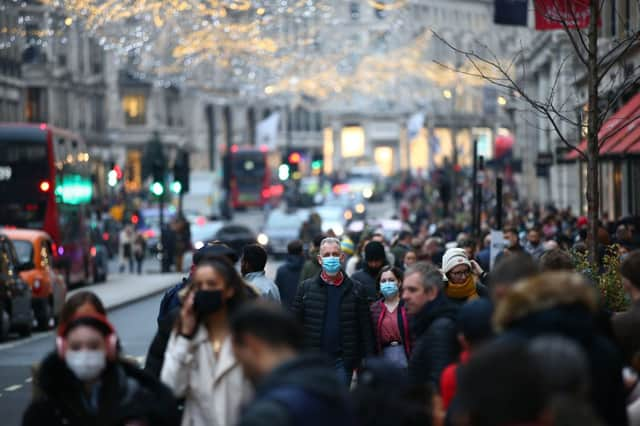Key findings on severity of Omicron variant in UK to be published today


Key data on the severity of the Omicron variant in the UK is to be published today, which could inform decisions on further restrictions.
The UK Health Security Agency (UKHSA) will release its analysis on the new strain, along with findings on how it impacts the effectiveness of Covid-19 vaccines.
Advertisement
Hide AdAdvertisement
Hide AdThe research comes following two studies released on Wednesday (22 December) which revealed that Omicron is less likely to cause hospitalisation than the Delta variant.
Omicron causes ‘milder’ disease
A study by Imperial College London found that people infected with Omicron are 15 to 20% less likely to need hospital treatment compared with Delta, while those who have had Covid-19 before are 50 to 60% less likely to be hospitalised.
However, researchers warned that the severity of Omicron may be offset by the “reduced efficacy” of vaccines to stop it being transmitted.
Another study from a team in Scotland also found Omicron appears to cause milder disease, after findings showed the variant lowers the risk of hospital admission by two-thirds compared to Delta.
Advertisement
Hide AdAdvertisement
Hide AdWhile the findings are positive, the Covid-19 incident director for Public Health Scotland warned it is “important we don’t get ahead of ourselves”.
Dr Jim McMenamin said: “The potentially serious impact of Omicron on a population cannot be underestimated.
“And a smaller proportion of a much greater number of cases that might ultimately require treatment can still mean a substantial number of people who may experience severe
“Covid infections that could lead to potential hospitalisation.”
Advertisement
Hide AdAdvertisement
Hide AdA preprint of the study also stated that, although the risk of hospitalisation is likely to be lower, retransmission is 10 times higher than the Delta strain
It states: “This national investigation is one of the first to show that Omicron is less likely to result in Covid-19 hospitalisation than Delta. It finds the rate of possible reinfection for Omicron is 10 times that of Delta.”
Data will inform plans for further restrictions
The studies released on Wednesday came as Covid-19 cases hit a record high in the UK, with daily infections topping 100,000 for the first time since widespread testing was introduced.
Despite the soaring case numbers, the Prime Minister has so far resisted imposing tougher restrictions in England to help curb the spread.
Advertisement
Hide AdAdvertisement
Hide AdBoris Johnson said that “continuing uncertainty” over the impact of Omicron strain means there is currently not enough evidence to justify the introduction of more Covid rules.
But he warned that the situation is “finely balanced” and further measures are not being ruled out after Christmas Day.
It is expected that the report from the UKHSA due to be released today will be used to inform plans for any additional rules, but it is still unclear how strict these could be.
The PM is understood to be considering three levels of restrictions, each varying in severity.
Advertisement
Hide AdAdvertisement
Hide AdOption one - the lightest of restrictions - would see families in England asked to limit the number of households they meet indoors over the festive period, without legal enforcement, according to The Telegraph.
Option two would mandate restrictions on household mixing, as well as see the return of social distancing and an 8pm curfew on pubs and restaurants, while option three would - the strictest of all - would see a full, country-wide lockdown imposed.
Stricter rules have already been announced in Scotland, Wales and Northern Ireland, with nightclub closures, social distancing, and limits on social mixing among the measures being put in place.